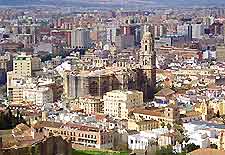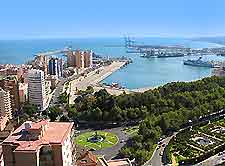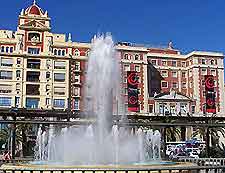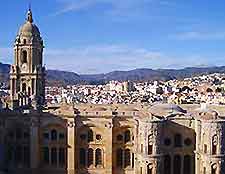Malaga Life and Visitor Travel Tips
(Malaga, Costa del Sol, Spain)

Malaga, Spain's sixth-largest city, has long been a favourite tourist destination and is famous throughout Europe, with many regular flights arriving at Malaga's airport. One of the most important city's along the beautiful Andalucian coastline, a visit to Malaga will not disappoint and the resort contains many impressive stretches of sandy beaches, warm waters and plenty of sunshine throughout the year.
Much of life in Malaga is not based around the city's busy tourist industry, with helpful travel tips and advice available at Malaga's tourist information bureaus and kiosks. Malaga is both a modern and cultural city with many traditional features, and is known for it freshly caught seafood, Tapas bars, afternoon siestas and long lunches. Life in Malaga is relaxed and this appealing lifestyle offers the perfect holiday atmosphere.
Tourism and Tourist Information (Oficinas de Turismo)
As a major holiday resort, Malaga contains a number of notable tourist information centres, offering a range of travel tips, attractions brochures, accommodation booking, city maps and festivals listings. The main tourist information offices in Malaga can be found along the Avenida de Cervantes and the Pasaje de Chinitas, with a further branch being available at the airport.
Municipal Tourist Office
Address: Avenida de Cervantes 1, Malaga, Costa del Sol, Spain
Tel: +34 952 134 730
Open hours: Monday to Friday - 09:00 to 14:30
Regional Tourist Office
Address: Pasaje de Chinitas 4, Malaga, Costa del Sol, Spain
Tel: +34 952 213 445
Open hours: Monday to Friday - 09:00 to 20:00, Saturday and Sunday - 10:00 to 14:00

Language
Spanish is the third most widely spoken language in the world, after Chinese and English. Although Spanish is the main language in Malaga, English, French and German are usually understood at most places actively catering for tourism. When travelling to smaller locations outside of Marbella, a phrase book can prove invaluable.
Tipping
Tipping is quite discretionary in Malaga, with taxi drivers usually being given a 5 to 10% gratuity or similar, although this is by no means compulsory. Restaurants always include service charges by law, and these should be clearly displayed on all menus, although a small tip will still be expected and very much appreciated. Hotel staff, such as luggage handlers, happily accept a tip of a Euro or two. Generally, no other public service workers in Malaga expect to receive tips.

Places of Worship
The national religion of Malaga and throughout Spain is Roman Catholic, although many other faiths and major religions are also represented in Malaga, such as Protestants and Muslims. There are a huge range of churches that welcome visitors, holding many services throughout the week and in particular, on Sundays, where visitors are always made to feel welcome. Malaga's most important church is La Catedral (Malaga Cathedral), which was built in the 16th century and stands in the heart of the city.
Smoking
In many of Malaga's main buildings, offices and on public transport, 2006 rules now dictate that smoking is prohibited with obvious no-smoking signage, unless specific smoking areas are present. Spanish legislation enforces the rights of non-smokers, with harsh fines for those caught breaking this law. However, most bars in Malaga offer rooms, gardens or designated areas for smokers, although it is often sensible to only smoke when others around you are already smoking.

Tips for Using the Euro
The Euro is made up of eight coins and seven paper notes and was introduced on January 1, 2002. The 12 original members of the European Union - Austria, Belgium, Finland, France, Germany, Greece, Ireland, Italy, Luxembourg, Netherlands,
Portugal, and Spain - planned the event for many years in advance, deciding upon a specific conversion rate for each country's national currency. The colourful Euro bills, which include holograms and shades of green, yellow, blue, mauve, and orange, are identical throughout Europe. Coins have one common and one national side, but they can be used in any of the member countries, regardless of the country of issue. Old currencies are no longer accepted as legal tender, although major banks will happily convert them into Euros.
Telephones and Emergency Numbers
- Emergencies in Malaga - for police dial 091 (national) or 092 (local)
- For fire emergencies in Malaga - dial 080 or 085 and for an ambulance dial 409 5530
- To call from one city code to another in Malaga- first dial '0' followed by the Spanish city code and the main telephone number
Safety
As with all major holiday resorts, the biggest security threat when visiting Malaga is by both bag snatchers and pickpockets, who are skilled and fast. Always be particularly careful with hand baggage in Malaga, wearing bags across your body, and never leave valuables on show in parked cars and hotel rooms.
Taxes
VAT (IVA) is always included in the price and refunds are unusual in Malaga and throughout Spain. Tourists visiting Malaga from countries outside of the EU may claim tax refunds where the item was purchased for personal use and cost more than a certain amount. If necessary, ask the shopkeeper for any further information about taxes.
 Malaga, Spain's sixth-largest city, has long been a favourite tourist destination and is famous throughout Europe, with many regular flights arriving at Malaga's airport. One of the most important city's along the beautiful Andalucian coastline, a visit to Malaga will not disappoint and the resort contains many impressive stretches of sandy beaches, warm waters and plenty of sunshine throughout the year.
Malaga, Spain's sixth-largest city, has long been a favourite tourist destination and is famous throughout Europe, with many regular flights arriving at Malaga's airport. One of the most important city's along the beautiful Andalucian coastline, a visit to Malaga will not disappoint and the resort contains many impressive stretches of sandy beaches, warm waters and plenty of sunshine throughout the year.

